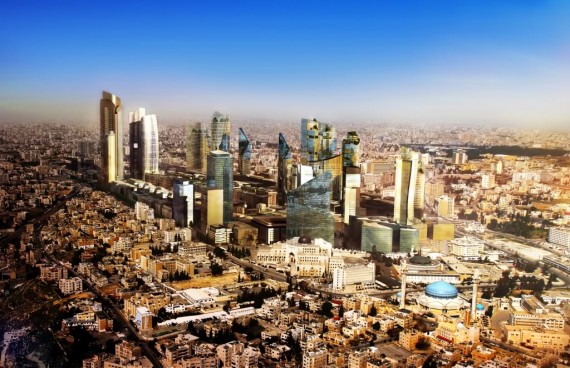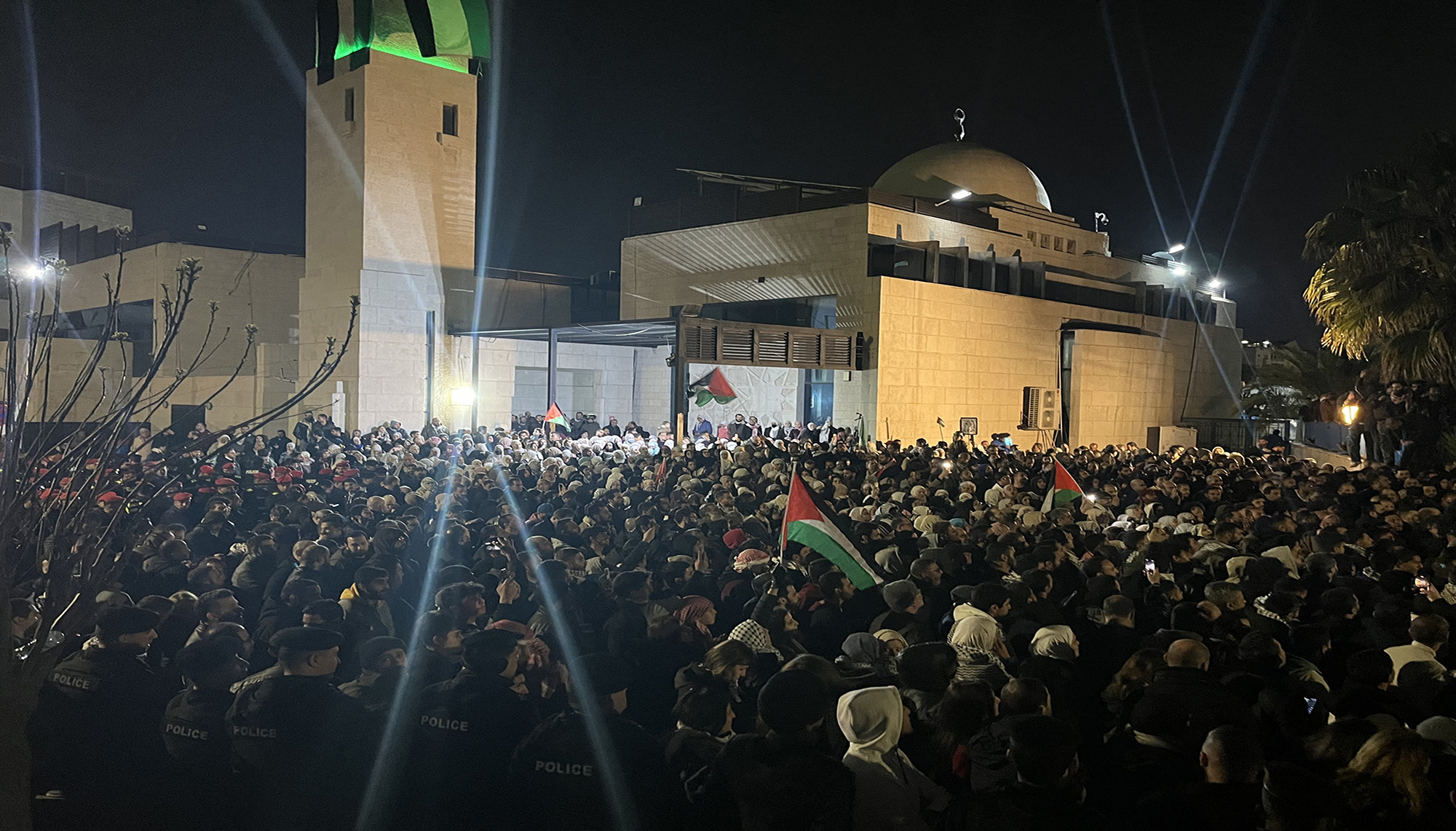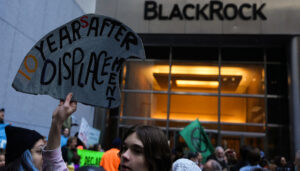
Written by Farida Farouk.
It is March 2040 and Rana Al Salem, 55, has just been appointed Jordan’s Interior Minister. She’s about to address the people to explain why she had accepted a post that as a young woman she’d always dreamed of. Rana’s office is in the greater Amman municipality, an area which was once desert but over the past few years has buzzed with university campuses and businesses. Rana will be talking to the nation from what used to be a prison. For years, the building’s underground dungeons had held many political prisoners, mostly Islamists. Her speech is brief, but remarkable. One of her first decisions as Interior Minister is to designate the old Interior Ministry as a national museum, including the prison, so that Jordanians would always remember the struggles of the past. Then, she appoints a poet as her deputy. Call me a romantic fool, she’d later say, but the Interior Minister should be a woman or a poet.
The post of Information Minister, also known as the “censorship minister”, has been renamed as the “Social Networking Minister” who is responsible for boosting the online communities that had become vital to Jordan’s civil society. Rana, wondered what her father would have thought if he was still alive, she had tried to explain to him that she belonged to a generation that would change Jordan, but to his death her father remained skeptical. He never told Rana that he’d read her blog secretly and was especially proud of the role model she had become for other young people when she started blogging. He was especially proud of one blog entry she’d written about a conversation she’d had with a young man. This blog item, like Rana herself and the other individuals in this article, are real, the future and the great hope of the Middle East. Rana’s father always had doubts about how a bunch of kids could change the country using their computers. Around the year 2015, a young man approached Rana and asked her if she was the writer of the blog “A Jordanian Woman”. When Rana said yes, the young man told her she was the reason he had started his own.
Moving right along to 2040: Rana’s boss, Prime Minister Ammar Al Radi, 50, knew all about how computers could change not just a country but a movement. The Muslim Brotherhood, the Islamist organization of which both his great grandfather and grandfather were leaders of, was using the internet to spread the message and express views.
Ammar developed a reputation for feminist sympathies when, as a board member of the Muslim Brotherhood’s English language website he wrote an article in 2020 for a Jewish newspaper in New York in response to a secular Jordanian female writer’s complaint that while she supported the Muslim Brotherhood’s right to exist, she didn’t believe they were returning the courtesy . Ammar had gone on the record as criticizing the Muslim Brotherhood’s supreme guide for calling the women writer “naked” because she wasn’t wearing a hijab when she’d gone to interview him. Ammar had supported his feminist credentials when he went on to write a blog post criticizing the Brotherhood’s stand, which said that Islam allowed women to vote but not to become a leader of a country.
Ammar and Rana got to know each other through a social networking site which began functioning as an online forum for young activists in Jordan. At a time when the government was becoming increasingly out of touch with the needs and troubles of the average citizen and, more worrying, unable or unwilling to provide them with services they needed, the networking activists were becoming both the oxygen and blood of Jordan’s civil society. They organized online fundraisers and encouraged their friends to go to poor neighborhoods and help out the people as much as they possibly can. The activists also used their networking sites and blogs to organize demonstrations and encourage each other to join nationwide strikes in support of workers protesting rising food prices and inflation.
The internet networking generation soon became central to Jordan’s civil society, taking the reins from a Muslim Brotherhood, which had lost touch with ordinary Jordanians after having won the parliamentary elections in 2015. Instead, it had become obsessed with moral values, suppressing women and banning music videos. The networking generation, no longer mere children, began in many ways to function as a shadow government, able to mobilize and provide services that the Muslim Brotherhood had once been famous for.
In 2022, India, then holding the chair of the G-10’s revolving presidency, took the historic step in of pushing Jordan along with other countries in the region to open their political space. Almost overnight, a flurry of underground political parties gained licenses, allowing them to exist in the open. Ammar immediately began maneuvering to create his new party. When Ammar was only 32, he along with two other young Muslim Brothers broke away from the movement and formed a new political party. Ammar and his other colleagues started hosting small meetings of like-minded fellows eager to form a national network.
When Ammar’s party won the general elections, he seized the opportunity to deliver on his promise to surprise Jordanians with his choice of a cabinet. He was especially eager to prove his administration would not be associated with the Muslim Brotherhood, but instead lay out a new vision of Jordanian politics: one that respected Islamic principles of social justice but did not mix religion and politics. Instead, he was determined to focus on rebuilding Jordanians’ crushed confidence by creating new jobs, stamping out corruption, and inviting rich investors into the country. By giving ministerial jobs to Rana and 18 other women, Ammar created Jordan’s first ever woman majority cabinet. It was a historic move that at once answered all the critics who continued to wonder if he meant it all those years ago, when he criticized the Muslim Brotherhood’s position on women leaders.
What better way to show his break away from the Brotherhood than to have a woman deputy who insisted that Jordan needed every man and woman working side by side to rebuild the country. Thankfully, his deputy had completed her graduate studies in Denmark and was well versed in Scandinavia’s success in supporting women. Ammar’s bold reforms looked toward the West, but his background still made him a man of the people.
One of the first people to congratulate Ammar was Somaya Al Hilali, who, in 2038 was appointed Saudi Arabia’s first female mufti. Somaya and Ammar had met at a conference in Dubai in 2018. As co-mufti, Somaya had shared her post with two men—one a Sunni and the other a Shiite. Their appointments coincided with the 36th anniversary of what is now recognized as a tragic turning point in Saudi Arabia’s relationship with its powerful clerics. In March 2002, 15 girls were burned to death in Mecca when officers of the morality police refused to let them out of their flaming school building and barred firefighters from rescuing them because the girls weren’t wearing the hijab. The ensuing outrage allowed then Crown Prince Abdullah to snatch girls’ education away from the clerics and to further promote his reform ideology. Abdullah had become king when his brother Fahd died in 2005. King Abdullah had often spoken of furthering women’s rights and introducing much-needed reforms into Saudi Arabia. Before his death in 2015, Abdullah had prepared legislation to allow women to drive, but more important, to introduce a new law that would prohibit hard-line clerics who also served as judges from passing verdicts based on their own interpretation of Islamic law. However, fundamentalist Wahhabi Islam was exported to the rest of the Islamic world where Saudi funded mosques and Islamic schools could be found from Indonesia to Nigeria. And as the Wahhabi clerics controlled the religious and educational domains, they became literally in charge of the people’s hearts and minds. The growing power of the clerics had translated into an obsession with women, especially as Saudi Arabia modernized. The more highways the country built, the more control over its women the clerics demanded. It became a nation that played out its identity crisis over women’s bodies. The obsession with women and religious police, backed by clerics, would patrol shopping malls looking for women with uncovered hair and ban shopkeepers who violated orders to shutter for prayer which only meant that very little attention was paid to the plight of the poor or the foreign workers.
The nephew who assumed the throne after Abdullah was laid to rest had not been expected to be much of a reformer. Surprisingly, the new king of Saudi Arabia was determined to set the kingdom on a course of social justice and gender Equality. By the time King Abdullah’s nephew, King Faisal was sworn in as monarch, the price of oil had plunged, which marked the beginning of the end of the Saudi welfare state. As the managerial posts dried up, Faisal encouraged young Saudis to train and apply for the junior jobs. Determined to create a more balanced role for Saudi Arabia in the region, Faisal reached out to China, India, and Iran.
In 2034, Faisal felt the country was ready and he asked Ahmed to become the first Shiite mufti and to recommend two others to share the post. Ahmed nominated Somaya Al Hilali and Fouad Sinan, his contemporaries from his internet networking site. Somaya, Fouad, and Ahmed had stayed in contact as their careers progressed and as Saudi Arabia and the whole region changed around them and because of them.
Islam was born in what is now Saudi Arabia, a magnet for millions of Muslim pilgrims to Mecca and Medina. If oil has been Saudi Arabia’s trump card on the international stage, then Islam is its pair of aces for the Muslim world, both in symbol and practice. The region today, in 2010, is full of young people with the majority of the population being below the age of 30. Paradoxically, their nations’ rulers are on the most part old, having for years fought off any potential alternative leaders, creating a political vacuum. The Internet, blogs, and social networking sites now give voices to those most marginalized, young people and women.
Generation Networking is the godchild of two important developments that took place in the past few years, an increasingly bold blogging movement and street activism. Both are among the few reasons for optimism in a region where most are pessimistic about the future. The recent Internet inspired activism has sparked a wave of unprecedented activism among young Jordanians and young men and women throughout the region. Bloggers have been instrumental in getting neglected stories into the headlines. The internet has given young people like Rana a space that does not exist in the “real world.” The new generation of bloggers might not be able to change their regimes today,
but in building communities and support groups online, they are creating the much needed middle ground that countries like Jordan desperately require. Generation Networking using the internet to create groups and communities that will eventually translate into a real presence in society, and this goes hand in hand with their ability to influence the future of their respective countries.
I am confident that Generation Networking is creating movements that will give Jordanians, and by extension the whole region, an alternative to the state and the mosque. In 2040, I will be 68 years old. Nothing would make me happier than to see Rana, Ammar, and Somaya make this dream come true!
Photo source.










